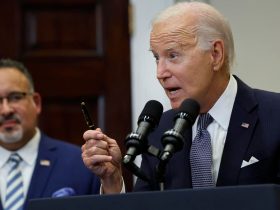There have been myriad abuses in the auto loan business in recent years. People desperate to buy cars that were in short supply during COVID were often taken advantage of by dealers and financers.
Auto loans are the third-largest category of outstanding debt, after mortgages and student loans, according to the Federal Reserve. In recent years, the cost of vehicles has skyrocketed, leading to increased borrowing. Many owners have also taken out loans against vehicles they owned, often at sky-high rates of interest.
The Consumer Financial Protection Bureau (CFPB) filed a lawsuit in federal court against auto-loan servicer USASF Servicing (USASF) for a host of illegal practices that harmed individuals with auto loans.
“These practices include wrongfully disabling borrowers’ vehicles, improperly repossessing vehicles, double-billing borrowers for insurance premiums, and failing to return millions of dollars in refunds to consumers,” the agency stated. The CFPB is seeking to obtain refunds for consumers and civil money penalties and stop any future violations.
USASF is an auto-loan servicer headquartered in Lawrenceville, Georgia. The company serviced auto loans that were originated by an affiliate, U.S. Auto Sales, Inc., which was a “buy-here-pay-here” auto dealer and lender with 31 dealerships in the Southeast. USASF offered both “Guaranteed Asset Protection and collateral-protection insurance,” which are products that consumers can purchase when they buy or lease a car. In April 2023, U.S. Auto Sales wound down most of its businesses.
The CFPB alleges that USASF:
- Illegally disabled cars: Many auto lenders require that cars are installed with devices using GPS technology that allow the lender or servicer to prevent a borrower from starting a car. USASF incorrectly disabled vehicles at least 7,500 times and caused these devices to play warning tones in vehicles over 71,000 times during periods when the consumer was not in default or was in communication with USASF about upcoming payments. USASF remotely disabled vehicles at least 1,500 times after explicitly promising consumers it would not do so.
- Failed to refund premiums to consumers: USASF offered consumers Guaranteed Asset Protection, which covers some of the difference (or gap) between the amount a borrower owes on their auto loan and what the car insurance will pay if the vehicle is stolen, damaged, or totaled. USASF failed to obtain millions of dollars in refunds from the Guaranteed Asset Protection administrator.
- Double-billed consumers and misapplied payments: When consumers were enrolled in collateral-protection coverage by a USASF affiliate, they were also charged for that same coverage by USASF. Approximately 34,000 consumers were double-charged for the insurance each billing cycle, in some cases for over a year, costing consumers millions of dollars.
- Wrongfully repossessed vehicles: USASF illegally repossessed the vehicles of some consumers who never qualified for repossession or had taken action to stop the repossession. In some instances USASF sold the vehicles that it had wrongfully repossessed.
A sub-sector of the auto loan industry provides credit using vehicle titles as collateral. It’s also been the subject of litigation and increased regulator scrutiny. Earlier this year, the CFPB fined Title Max $15 million, alleging it violated the Military Lending Act. In an unrelated action, the Pennsylvania Attorney General sued Auto Equity Loans of DE, LLC, earlier this year, reaching a settlement that mandated consumer refunds of about $1 million.
The Pennsylvania AG Michelle Henry claimed Auto Equity “levied illegal interest rates — with some borrowers paying more than 200% in annual interest.” The company no longer operates as a title loan business.
What can you do if you had bad-faith dealings with auto lenders? Consumers can submit complaints by visiting the CFPB’s website or by calling (855) 411-CFPB (2372).
Read the full article here











Leave a Reply